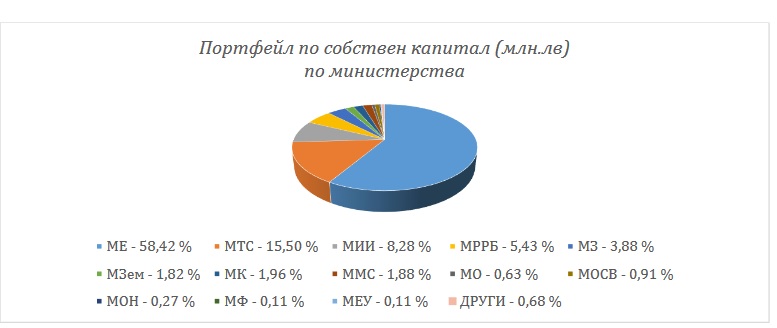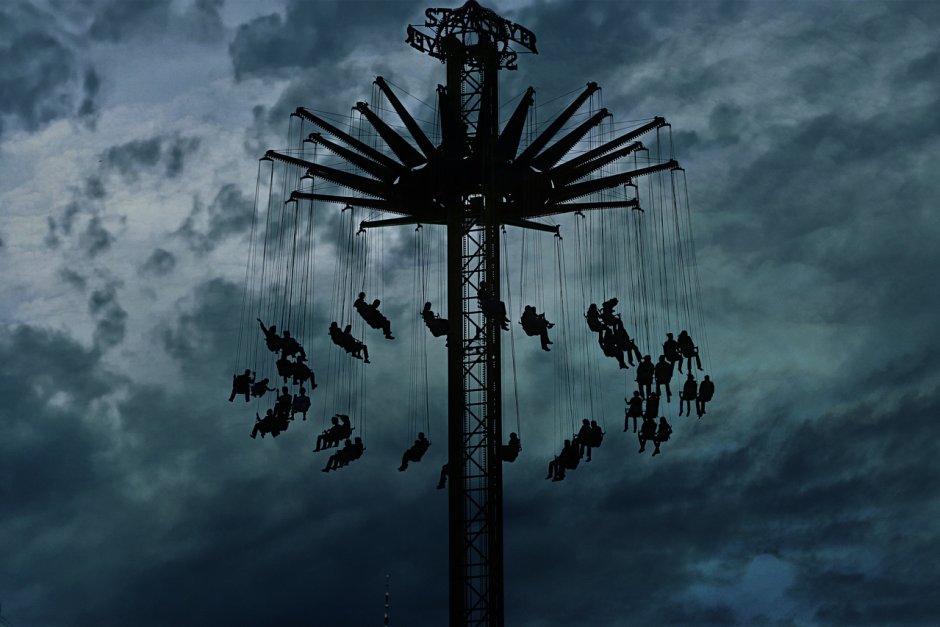Marry-go-round. But without the lights. In a dark corner of the economy. Many heads of state-owned companies have been on and off it. For some it turned into a dark ride, from which they emerged spooked out and heading straight to the police, the Prosecutor’s Office, maybe even to court. For reference, here’s the story of the last two directors of Bulgargaz.
After decades, the public had got used to it: a new government comes and new directors, board chairs, who are close to the new elites, are appointed to the state-owned firms. Even members of director committees, which are part of the political cabinets of the ministries under whose authority and ownership are the companies in question.
Sometimes, under public pressure, there has been talk for contests, professional managers, introducing mandates, and protection of the directors from political favors and unbased firings. In order to secure predictability, effective governance of state capital, budget revenue and creating sa competitive market environment.
All those things are part of the requirements of a transparency and governance of state-owned companies, which are laid out by the Organization for Economic Co-operation and Development, of which Bulgaria looks to become a member. Precisely for this reason Boyko Borissov’s government adopted in 2019 a special State-owned Enterprises Act, which came into force January 1, 2020, and should have ensured that the state-owned companies have quality figures at their helm. Even the Public Enterprises and Control Agency, which is the successor of the former public body in charge of privatization, had to propose part of the board members of the companies with more than 50% state ownership of the capital. They had to be independent, and also all of them had to have a vision for the development of the company in question, and to have a sustainable business plan.
Rules in paper and proforma
This is a piece of legislation that is on paper, and its withholding is only proforma, while the reality is very far from the recommendations of OECD. The neglect of the adequate and transparent governance of state assets is also evident by the fact that it took almost three years after the law came into force into force, for a policy for the state’s involvement in public-owned enterprises, to be adopted, and by the caretaker government at that. The policy is also a requirement by OECD but why hurry with that? Better fix the "contests" for directors first.
The alleged "contests" in 2020 in reality only reinforced GERB’s political appointemet at the head of key sectors like the energy, transport , forestry, healthcare and other sectors – be it economic or public. These competitions were so fixed that PECA certain candidates had to be made up as PECA independent nominations, which in turn dutifully suggested political professionals. Although the names of the candidates were known and who progressed through the rounds as well, nothing was known of their experience or their visions for managing the companies. This is how some seats on the board of Bulgargaz, for example, were taken by people without any experience in the gas sector.
Most of the "chosen in contest" in the last months of GERB’s governance, however, very soon fell off the marry-go-round. Either under Kiril Petkov’s, Stefan Yanev’s or Galab Donov’s caretaker governments since, these appointments were changed. The key point here is that although almost all instances of dismissal in the last two years have been formally without motive only e few have filed protests against the official appointment of their successors by the courts. None have been sustained. Most did not exercise their right of appeal likely realizing that "so it goes in state-owned companies". Or they are waiting to get on the marry-go-round again after the snap elections in April.
In the meantime, the government – effective or not – is getting on, the financial results – good or bad – are piling, which the budget is awaiting its pidends. That is, the state and the public have a direct interest for the state-owned enterprises to win as much as possible and to develop rapidly.
Never ending contests
Even now, tens of competitions for bords of state-owned companies are open. In the energy sector, the caretaker government has " formalized" its appointments to replace those vacated "pending a competition". Naturally, it must comply with its own amendments to the rules for implementing the Public Enterprises Act, according to which a new appointment must be made within six months. However, credit must be given to Donev's government for putting an end to the sacking of state directors without motives.
This, however, does not make choosing managers of public enterprises any more transparent or their governance more effective. Not a single state-owned company has published a business plan, and those need to be revised at this point. Galab Donev’s cabinet has given a deadline until 31 December 2022 for the companies to publish their updated business plans, but they evidently are not in a rush to do so. If they even have been updated at all.
Three years after the enactment of the Public Enterprises Act, the agency in charge has not initiated a single inquiry. According to a decision from the last days of the third Boyko Borissov governments, PECA was supposed to review the governance of eight companies. 2021. The companies in question are micro, small and medium, not very known and outside the public focus. There is no deadline for these reviews. In October 2022 the Donev cabinet added nine more companies to this list. Among them are companies like "Ribni Resursy" (Fish Resources), "Miniproekt" (Mine Project), the National Music Agency, but also the Bourgas Harbor, and Intendatsko Obbsluzhvane:. These have a deadline for completion – end of June 2023.

Work assessment. But how?
A methodology for these reviews does not excist, however, Rusi Statkov of the Supervisory Board of PECA told Mediapool.bg. In his words, such is in the making at the moment and its approval is pending from the Supervisory Board of PECA very soon, so it can be approved after by the cabinet.
The National Electric Company, Bulgargaz and others do not fall under the radar of this assessment by the government. But one is definitely necessary. Especially after the latest information to come out of the USA under the Magnitsky Act about the former energy minister Roumen Ovcharov and the former directors of NPP Kozloduy Ivan Genov and Alexander Nicolov and their part in a corruption scheme connected to public procurements and electricity deals allegedly winning them millions of Euros and leva.
With the forthcoming consecutive drama with forming a government, we will likely never get to know what the assessments of the nine companies have concluded. Or the Council of Ministers will issue the usual press release that the "Cabinet accepted the report with the assessment of…". But what does it contain? If you want to know, you are welcome to look for it in the legal archive. You may find it, or you may not.
Finding a place for the person
Rusi Statkov admitted that there are many flaws in the Public Enterprises Act, and that the PECA does not have much influence in the way contests for directors are conducted, while the control is not yet regulated. In his words, the agency may intervene in the process of nomination of the so-called "independent members" of the boards of state-owned companies. The last word, though, on who these members will be, falls to the relevant ministries.
The ministries are the ones that shortlist candidates that are to be nominated by the special commission at the PECA. It should only confirm that the candidates are eligible but for example during competitions carried out by the Energy Ministry under GERB, there were paradoxical changes and candidates that were part of the quota of the ministries were appointed from the quota of the "independent", while other independent candidates fell out of the competition midway. It turned out also that there is not clear mechanism for protesting being excluded from the process and not moving to the next round of the de facto predetermined competitions. Although formally the rules for applying the Public Enterprises Act provides for such a candidate to file a complaint to the review committee, the mechanism does not work. It doesn’t help in court either, if it even reaches to court. This in turn automatically discourages quality candidates from applying at all, which leaves only political candidates by default.
PECA is still more transparent in giving out information (albeit with delay) regarding the names of the candidates. But that is as good a s it gets. Inquiries into their professional experience, their vision for managing the company they are applying to head? No.
What are the requirements of OECD?
This whole mechanism entirely contradicts the guidelines set out by the OECD for corporate governance of public companies According to the document there needs to be "a clear statement to the public of enterprise objectives and their fulfilment (for fully-owned SOEs this would include any mandate elaborated by the state ownership entity)." Another requirement is to have clear remuneration for the members of the committees, a selection procedure, including policies for persity in the committee, memberships in other company boards and whether they are deemed independent according to the board of the state-owned enterprise. "SOE boards should, under the Chair’s oversight, carry out an annual, wellstructured evaluation to appraise their performance and efficiency", the document further recommends but whether this guidance is followed by the Bulgarian state companies is only for their principals to know. The voice of the so-called independent board members has not been heard a single time on any subject.
Another key point in the guidelines in that "[e]mployees of the ownership entity or professionals from other parts of the administration should only be elected to SOE boards if they meet the required competence level for all board members and if they do not act as a conduit for political influence that extends beyond the ownership role."
According to the advice by the Rich Club, of which Bulgaria is looking to be a member of, "[t]he government should develop an ownership policy". Such a policy was adopted only by the last caretaker government led by Galab Donev in October 2022, but in it the fiscal and non-fiscal goals are very general and declamatory, and refer to OECD’s guidelines, which, as was made apparent, are far from what a number of governments have practiced – GERB’s, Prodalzhavame Promyanata (We Continue the Change) and caretake governments alike.
The expert from the Centre for Democracy Research Martin Vladimirov described as a shortcoming of the Public Enterprises Act that it fails to introduce the whole bundle of mandatory standards for corporate governance of state-owned companies. Especially in the energy sector.
Without competition, with political connections
"In fact, the absence of real (not just on paper) introduction of principles would make Bulgaria’s membership in OECD harder", he told Mediapool.bg. Vladimirov noted that "while it is true that the law provides a mechanism for electing "independent" experts, who should operate as external observers and correctors of the decisions of the governing boards, which are dominated by long-time members from the company or former political appointments, but this is not happening in reality. The fact that PECA is not an independent body but is appointed by the Council of Ministers (regardless of the lack of clear criteria for electing the governing body of the institution), makes it impossible for a full distinction between the political power from the appointments in state-owned enterprises", the director of the energy and climate program of the CDR commented.
According to him, the implemention the law after 2019 clearly shows the reluctance of selection contests to allow real competition between different visions for the development of state-owned enterprises. He said that only persons whose biographies show political connections or lack real experience in the business sphere of the respective company carry on in them. "All government appointments, regardless of political support, remain the prerogative of the Council of Ministers, often either bypassing the competition procedure entirely or it is carried out pro forma," says Vladimirov.
One shortcoming of the law on public enterprises he pointed to is that it focuses on the selection of members of state boards, but not on the overall mechanism of decision-making and ensuring transparency and a clear separation from political influence. Vladimirov believes that the PECA members should be appointed by Parliament with in an open and public procedure, so that everyone is familiar with the biographies of the governing body".
Market, society, regulations: to hell with them all
"PECA should work in close relations with the Commission for the Protection of Competition, the anticorruption Commission and Public Financial Inspection Agency to guarantee that the governance of the companies does not break the Competition Act, that timely and exhaustive audits of the financial governance are carried out and there is not direct involvement of the government and politicians as a whole, into the decision-making process", the independent expert said.
It is the latter aspect of good corporate governance of state-owned companies that is most clearly visible in the last three decades. In practice, the state interferes in every move of the company (like in the case of Bulgargaz tenders for the supply of natural gas or the bilateral agreement with BOTASH), preventing the management boards of the companies from reacting quickly and efficiently to the changing market environment due to political disagreement, which often damages companies and society as a whole," adds Vladimirov.
"There’s a need for Chinese wall to be erected between the government and the governing bodies of the state-owned companies, and institutions such as the Prosecutor's Office or the Anticorruption Commission should not be allowed to manipulate the decision-making process, and for political reasons raised by one or another government/political party pressure on company management through often unfounded investigations," the CRD expert said.
"The reality is that even when such drastic measures are not taken against one or another member of an enterprise's governing body, line ministers ignore the established decision-making process and carry out fast-track procedures to remove inconvenient board members. Now this it is happening more subtly than before 2019 when we observed a ceaseless marry-go-round at the top of state-owned companies, but in practice little has changed even now," Vladimirov concluded.
On the edge of conflict of interest and changing all the time
A quick overview of the appointments in different state-owned companies from different sectors, even hospitals, show that the directors change extremely often, and the appointments are not just political but just on the edge of conflict of interest. And all this is done under the threat that the post is very short-term, regardless of having won a three- or five-year mandate. In waiting for the next government even quality managers – if such are ever tempted by the public sector – wouldn’t be able to develop their potential.
Mediapool.bg will continue to follow the story with the appointments in the dark in the public sector.
Read tomorrow about the scheme "New minister – new director" and the change of hospital directors over several months in an untransparent procedure. Are people close to the parties’ secured posts in key hospitals, who redistribute billions of leva each year through public procurement procedures towards technical equipment suppliers, pharmaceuticals, consumables etc. These are activities with high corruptive potential. When the expectations for the Recovery and Resilience Fund are added to this, the appetites grow even further.
In the next days we will uncover how companies in the forestry sector owners of timber companies are being appointed and how political arguments in the other big company under the umbrella of the Ministry of Agriculture, Irrigation Systems, delayed the absorption of 107 million Euro EU money.
It is interesting that the BSP and GERB made the state transport companies, the postal services, the key state-owned enterprise Highways, made popular with its in-house procedures for the development of highways and the distributed millions of leva in the dark to subcontractors, as well as the Bulgarian Water Pipeline Holding where the state budget injected one billion leva to stabilize the sector but for years the funds simply stay in the accounts and in a time of high inflation rates and increasingly expensive construction prices. The inaction there is especially visible and leads to the disappearance of financial resource.
ЗThe state of state-owned companies by 2021
According to data by the PECA, the companies under the Ministry of Energy, the Bulgarian Energy Holding group, have the largest weight in the state economy. In 2021 the share of companies under its umbrella in the country's GDP was 9.9%.
In the the equity criterion, the heaviest company, is the participation of the state in portfolio of the Ministry of Energy - 58.42%, the Ministry of Transport - 15.50% and the Ministry of Economy - 8.28%. The companies from the Health and Social Work sector account for 46.97% of the state portfolio; the Water Supply and Waste Management Sector - 12.88%. The Transport sector accounts for 5.68%.

Source PECA
The profit from public enterprises in 2020 is 642 million leva. The most significant contribution is made by energy sector- 76%; economy accounts for 11.7%, construction - 6.6%, transport - 1.8% and other - 3.9%.
In 2019 state-owned enterprises performed much better. The drop in profits in 2020 compared to 2019 was 768 million leva. The decrease in the energy sector was from 1,072 billion to 488 million leva. The results in 2022 are certainly much better, but those were seized by the state for compensation due to high energy prices. According to Rusi Statkov, these programs prevent state-owned companies from carrying out their investment plans and to make technological updates and thus achieve better financial results, and for those to be substantial. The PECA supervisory member believes that the state should also review its policy of seizing pidends from public enterprises.
In 2020 208 million leva worth of dividends were charged from the state-owned enterprises. 81% of this is from the Bulgarian Energy Holding. At the same time, 743 million of devidents were owed from the activities of the state-owned companies.
The Bulgarian version of this text can be found here.
За честна и независима журналистика
Ще се радваме, ако ни подкрепите, за да може и занапред да разчитате на независима, професионална и честна информационно - аналитична медия.
 0 коментара
0 коментара
Екипът на Mediapool Ви уведомява, че администраторите на форума ще премахват всички мнения, съдържащи нецензурни квалификации, обиди на расова, етническа или верска основа.
Редакцията не носи отговорност за мненията, качени в Mediapool.bg от потребителите.
Коментирането под статии изисква потребителят да спазва правилата за участие във форумите на Mediapool.bg
Прочетете нашите правила за участие във форумите.
За да коментирате, трябва да влезете в профила си. Ако нямате профил, можете да се регистрирате.





